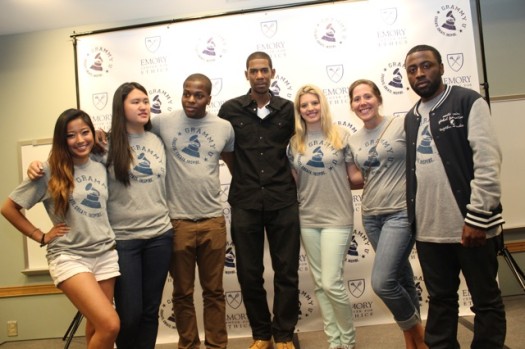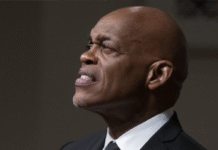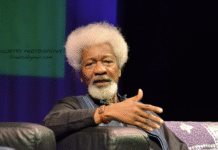
The digital age has led many people to think it only takes a MacBook and GarageBand to make quality sound recordings.
Young Guru says there’s more to it. “You need to know how to run equipment. Be interested or curious about it. People go to school to learn equalizers and compressors, but when they first get in the session, someone has to actually teach them how to run a session.”
The Grammy Award-nominated go-to engineer and DJ for Jay-Z curated “Era of the Engineer” at Emory University’s Center for Ethics on Apr. 26. His Atlanta visit was one of a 13-city college tour courtesy of The Recording Academy’s GrammyU program.
In the studio, Guru has the task of making sure performers deliver strong vocals. His knack for adjusting the knobs on the console landed him with Beyonce, Rihanna, Nelly, Ludacris, Mariah Carey, Jack White, Alicia Keys, Ghostface, Talib Kweli, Kanye West, 50 Cent, Busta Rhymes, Eminem, Little Brother, T.I., Rick Ross and Drake.
The laid back and extremely cordial 39-year-old born Gimel Keaton in Wilmington, DE talks about Bob Power, Tony Maserati and Dr. Dre as his inspiration. Each session, he says, should stimulate an engineer’s recording techniques.
“By working with a huge gambit of people, it makes your skills that much bigger. It’s about adding on to a legacy of music that preserves the culture and advances it. Preservation doesn’t mean make it stagnant,” Guru says.
The Howard University alumnus, who saw classmates like Digable Planets and Sean “Diddy” Combs on campus, became tour DJ for female hip hop artist Nonchalant in 1996. Investing his own money and time into sharpening his skills at Omega Recording Studios, Guru believes an engineer’s main priority is to demonstrate strong social skills.
“With any artist [not just Jay-Z], I try to help them facilitate being the best them. I analyze the artist where they are in their career at a given time. I see what I think would be necessary to help that artist propel themselves into the marketplace. You won’t get to showcase your technical expertise if you can’t communicate.” Guru says.
He especially points out offering constructive criticism. “There is a huge amount of the music business that is ethics: what your morals are, how far you will go and what you consider right or wrong. People have different learning styles and different goals. You figure out where people want to go and add onto who that person is,” he says.
Engineers, like Young Guru, progress culture. On his last trip to Atlanta in March, he hosted a workshop with Georgia Tech’s EarSketch program, which teaches writing computer code for creating remixes. He offers a scholarship through his foundation to a student pursuing sound production at SAE Institute in Capetown.
The technical maestro is also penning a virtual eBook on demonstrating audio production techniques and releasing a line of headphones, AIAIAI TMA-1, that brings the full studio experience.
Those aspiring careers in music, Guru says, should constantly evolve and challenge their skills. Point well taken considering the former student-athlete turned down 50 scholarships offered to him.
“Free your mind. Think about things in a way that you’ve never thought about them before. It sometimes gets you in trouble with popular culture, but it will inevitably write you into history,” he says.
This post was written by Christopher A. Daniel, pop cultural critic and music editor for The Burton Wire. He is also a contributing writer for Urban Lux Magazine and Blues & Soul Magazine. Follow Christopher @Journalistorian on Twitter.
Like The Burton Wire on Facebook. Follow us on Twitter @TheBurtonWire.








